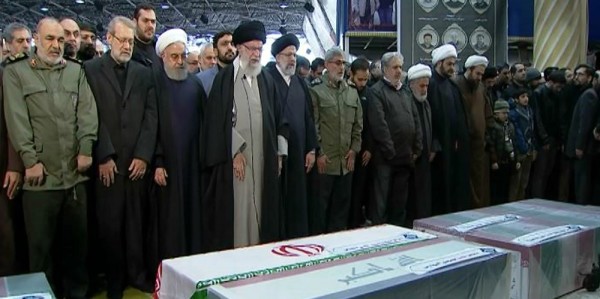

While Iran and the United States remain one shot away from war, the fact that Iran’s ballistic missiles did not inflict casualties on American, coalition, or Iraqi forces appears to have given both sides an out, at least for the moment.
But experts agree that Iran has not finished seeking revenge for the death of Maj. Gen. Qasem Soleimani, who was killed by a U.S. airstrike in Baghdad. Iran retaliated by firing 16 short-range ballistic missiles at two Iraqi bases that host U.S. troops. President Donald Trump has decided to impose further sanctions on Iran rather than responding militarily.
The immediate crisis may be over, but Iran is likely to “resume provocations” unless it gets some relief from the United States’ maximum pressure campaign, said Michèle Flournoy, who served as Under Secretary of Defense for Policy from February 2009 to February 2012.
“I think those are most likely to be either covert or clandestine or through proxies or directed at others in the region,” said Flournoy, now managing partner of WestExec Advisors, a strategic advisory firm in Washington, D.C. “I think they’ve come away from this crisis understanding that President Trump has a red line in terms of killing Americans. So I think it’s more likely that they may launch cyber attacks.”
Iran could also launch further attacks against Saudi Arabia’s oil infrastructure to cause economic turmoil that would pressure the Trump administration to resume negotiations over Iran’s nuclear program, she said.
Whatever actions Iran decides to take may not happen for a while, said Michael Rubin, who worked as a Pentagon advisor for Iran and Iraq from 2002 to 2004.
“I expect things to quiet down for a little, but I don’t think this is over … simply because of how significant a figure Qasem Soleimani was, No. 1,” said Rubin, now a scholar at the conservative American Enterprise Institute think tank in Washington, D.C. “And No. 2: In the past, we’ve always seen Iran playing the long game.”
Iran will probably spend the coming weeks looking for soft targets that can be struck by proxy forces to give the Iranian regime the veneer of plausible deniability, Rubin said. Those attacks could occur outside the Middle East, where the United States is least expecting Iranian retaliation.
“I’d be much more worried being a diplomat in Bangkok than in Beirut,” he said.
That said, Iran’s goal may not be to kill Americans. Brig. Gen. Amir Ali Hajizadeh, commander of the Islamic Revolutionary Guard’s Aerospace Force, has reportedly claimed that the missile attack was meant to damage U.S. equipment, not inflict casualties.
As with everything Iranian officials say, Hajizadeh’s comments should be treated with a high degree of skepticism. Indeed, Army Gen. Mark Milley, chairman of the Joint Chiefs of Staff, has said he believes the Iranian missiles were meant to kill U.S. troops.
Still, one former senior intelligence official said it is possible that Iran deliberately sought to avoid causing the death of Americans with their missile strike.
“Those in the Situation Room obviously have more information than the rest of us,” said the official, who spoke on condition of anonymity. “That said, I am not totally convinced that Iran sought to kill people, given that reportedly several hours of notice were given during which the expeditionary aircraft maintenance shelters and other sites struck were presumably evacuated so that all personnel were inside hardened structures when the missiles impacted the various locations.”
Defense Secretary Mark Esper has denied that the U.S. military was given any advance warning of the Iranian attack and he has attributed the lack of fatalities to various early warning systems. The Pentagon has not elaborated on what these systems are or how much time U.S. troops had to find shelter before the Iranian missiles hit.
Iran’s Foreign Minister Javid Zarif implied that his country’s military response to Soleimani’s killing was finished when he tweeted on Jan. 7 that Iran had “concluded proportionate measures in self-defense” and it did not seek any further escalation.
However, Iran’s Supreme Leader Ayatollah Ali Khamenei subsequently tweeted that the missile attacks were not Iran’s final say on the matter.
“They were slapped last night, but such military actions are not enough,” Khamenei tweeted on Jan. 8.
At the moment, Iran’s true intentions remain unclear, said retired Army Gen. Joseph Votel, who led U.S. Central Command from March 2016 to March 2019.
“I think we have to exercise vigilance and patience before we conclude that the Iranian regime is done responding to the death of Solemani,” Votel said. “They have multiple ways to respond and it is important that their words match their actions.”
Not getting the Pentagon Run-Down? Sign up here!
Jeff Schogol covers the Pentagon for Task & Purpose. He has covered the military for 14 years and embedded with U.S. troops in Iraq and Haiti. Prior to joining T&P, he covered the Marine Corps and Air Force at Military Times. Comments or thoughts to share? Send them to Jeff Schogol via email at schogol@taskandpurpose.com or direct message @JeffSchogol on Twitter.
